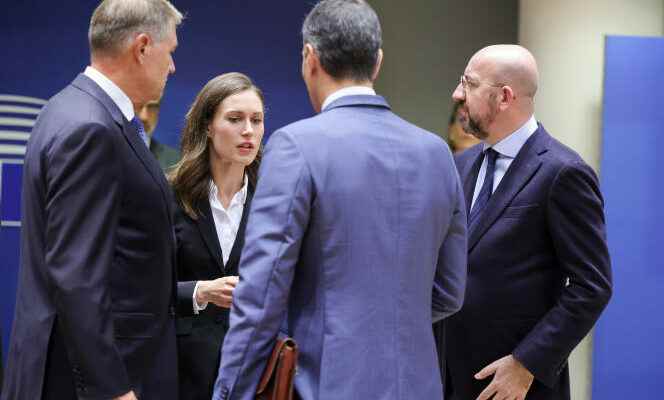It is a small neutral phrase in the conclusions of the European Council which was held on Thursday 20 and Friday 21 October in Brussels. Member States have had “a strategic debate on the relations of the European Union with China”. The sobriety of this statement should not mislead. The Twenty-Seven devoted nearly three hours on Friday to discussing relations with their first trading partner.
The debate has continued to intensify in recent months, between member states, with the war in Ukraine and the support provided by Beijing to Russia, but above all, with the rise of tensions in the Taiwan Strait. “For several years now, China has appeared more and more as an alternative economic, political or social model. A model that challenges the Western vision, and this in a more assertive, even aggressive way”summarizes a senior European official.
“Our own model to develop”
The community authorities would thus like to convince the Twenty-Seven to strengthen their message vis-à-vis Beijing, while maintaining their autonomy vis-à-vis Washington, who tries to bring them into a systematic confrontation. “We have our own model to develop”defended Charles Michel, the President of the European Council. “It is important that Europe operates with the greatest possible self-confidence, but also independently”recalled Mark Rutte, the Dutch Prime Minister.
Since 2019, Europe has defined its relationship with China according to a triptych. China is considered both as a partner in commercial matters or on major global issues such as the climate, a technological and economic competitor and a systemic rival, with its own model of values, distinct from a democratic European model. “It is a fairly plastic concept, which makes it possible to encompass the relations of the Twenty-Seven with Beijing”translates a European diplomat. “For now, we have no intention of changing this grammar”assured Emmanuel Macron, at the end of the debates.
Some Member States such as the Baltic countries are in favor of a much more frank confrontation with the Middle Kingdom
Nevertheless “the center of gravity of this triptych shifts more and more, from partner to competitor and rival”, recalls a European diplomat. However, European states are still divided on the right position to find vis-à-vis Beijing. Some member states such as the Baltic countries, traumatized by the reprisals carried out by China against Lithuania when the latter moved closer to Taiwan at the end of 2021, are in favor of a much more frank confrontation with the Middle Kingdom.
You have 55.54% of this article left to read. The following is for subscribers only.
